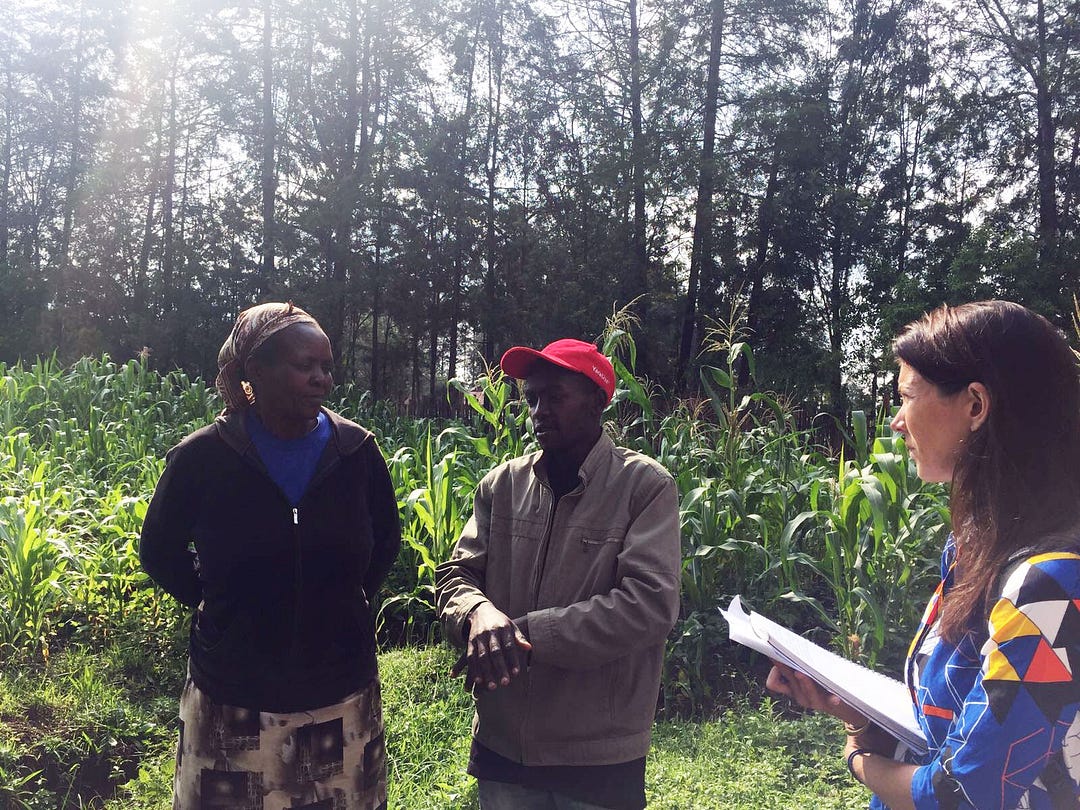
Venture Lab recognizes that support beyond capital is critical to seed-stage fintech companies. Our portfolio engagement work is customized to the post-investment needs of our partner companies and includes business model refinement, sector expertise and access to networks, and strategic and operational support. To date, we have engaged in over 55 intensive, short-term projects with investee companies in core business areas. Recently, Reilly Kiernan and I traveled to Kenya to work with Apollo Agriculture, one of our newest portfolio companies.
The Apollo Agriculture Model
Apollo Agriculture is a tech-enabled input financing solution for smallholder farmers that was founded in 2016 by Eli Pollak and Earl St Sauver, both former employees of the Climate Corporation, and Seth Silverman, former head of Kenya operations at One Acre Fund. The founders’ vision is to help smallholder farmers in emerging markets maximize their profits.
Apollo’s model combines a new credit product with sophisticated analytics, remote sensing, and agronomic machine learning. Farmers can purchase high-quality farming inputs (like hybrid seeds and fertilizer) on credit with flexible repayment terms and post-harvest due dates. The offering also includes crop insurance and customer-centric, voice-based trainings developed by the Apollo team to help farmers learn best practices for tasks like planting, combating pests, and developing financial literacy.”
Each farmer’s plot is GPS-mapped and satellite-tracked to provide up-to-date data on crop production and health.
Apollo kicked off its operations last year, staffing up a Nairobi-based office and serving maize farmers in the Nakuru region of Kenya. Apollo generates large volumes of data about each customer, which is processed using machine learning. Over time, this will enable the company to make better lending decisions and provide customized support for farmers, based on specific needs.
Portfolio Engagement in Action

In advance of next season’s harvest, Apollo is thinking hard about its growth strategy, and like most startups, juggling many complex moving pieces. Venture Lab’s portfolio engagement team has regular check-ins with our companies to discuss potential areas of support that we can provide. We are very intentional about the type of support we offer — more generalist and bespoke, with clear timelines and responsibilities — so we work together with portfolio companies to bridge any critical gaps or offer an extra set of hands without creating a void when a particular project ends.
During a recent check-in call, Apollo and the Venture Lab team discussed ways that we could support the end of its first pilot and start of its full program roll-out. Although the Apollo team is highly capable and experienced with customer surveys, they are also in the midst of recruiting key hires, fundraising, completing their pilot, identifying new markets, and more — all while staying as lean as possible to keep costs down.
So, to free up some of Apollo’s bandwidth and deepen our expertise, Venture Lab and Apollo agreed that Venture Lab could be most supportive to their current needs by helping with their pricing strategy, specifically with answering key questions:
- What do the economic lives of smallholder farmers look like? How does this impact farmers’ ability to pay?
- What are farmers’ current practices for financing inputs?
- How do farmers value the Apollo product? What drives this value? How does this impact willingness to pay? What price can Apollo charge for the product?
- What payment structures are most supportive of repayment for this population — incorporating an understanding of behavioral nudges and seasonality of cash flow?
We then spent two weeks in Kenya working closely with Eli Pollack and Operations Manager, Benjamin Njenga, to gather customer insights on the current Apollo package and pricing through focus groups and one-on-one conversations with a total of 84 individual farmers. This field engagement yielded several important insights and reflections about Apollo’s model and what it means to price a product for smallholder farmers:
- Power of aligned incentives: Apollo only succeeds if its farmers succeed. The ability to drive higher yields and ensure higher incomes for farmers is necessarily tied to the likelihood of repayment. At Venture Lab, we look for models where financial inclusion is core to the product, and we see this in how Apollo’s pricing strategies are designed to help create value for farmers in addition to creating sustainable margins for themselves.
- Understanding your customer: To design a product that meets farmers’ needs and to price it reasonably requires understanding farmers’ realities. For example, in the course of our work, we learned more about when farmers have cash (such as when harvesting shorter-term crops like beans) and recommended that Apollo design a milestone to encourage farmers to make loan payments at this point when they likely have some liquidity to do so. We also learned that though there are some common challenges for smallholders, there is no one-size-fits-all solution to financial inclusion for this customer group. Farmers vary along many dimensions (regions, business knowledge, access to incremental/recurring revenue, etc.). Understanding not just the big picture, but some of these key drivers of difference, is critical for models serving this population.
- Using behavioral science: Apollo’s approach to encouraging repayments draws from behavioral science best practices, including using deposits as a commitment device and designing incentives to encourage repayment. Incorporating a better understanding of how customers make decisions and how to encourage behaviors will be critical for Apollo.
As farmers harvest their crops and repay their loans, Apollo will learn from the results of its first year and design a strategy for reaching even more farmers.